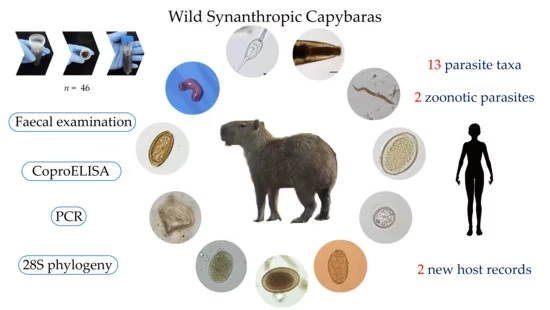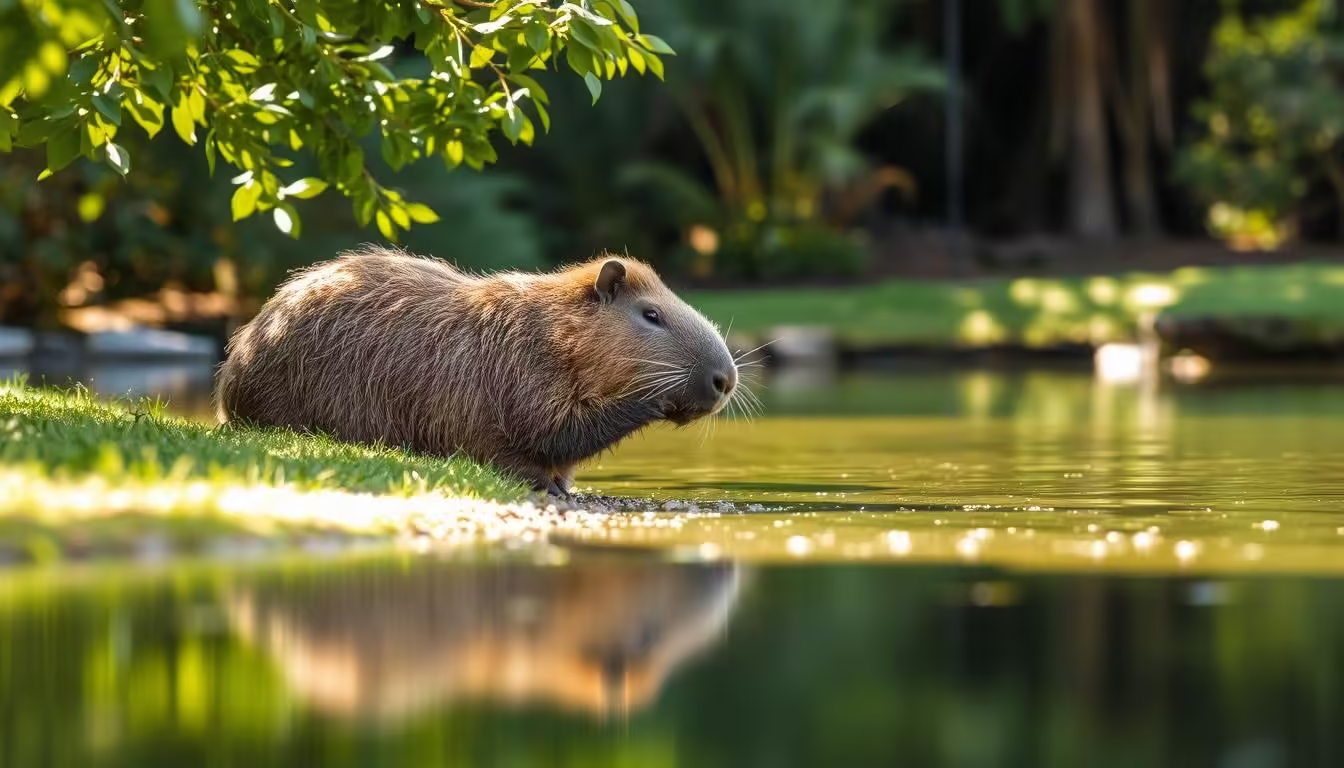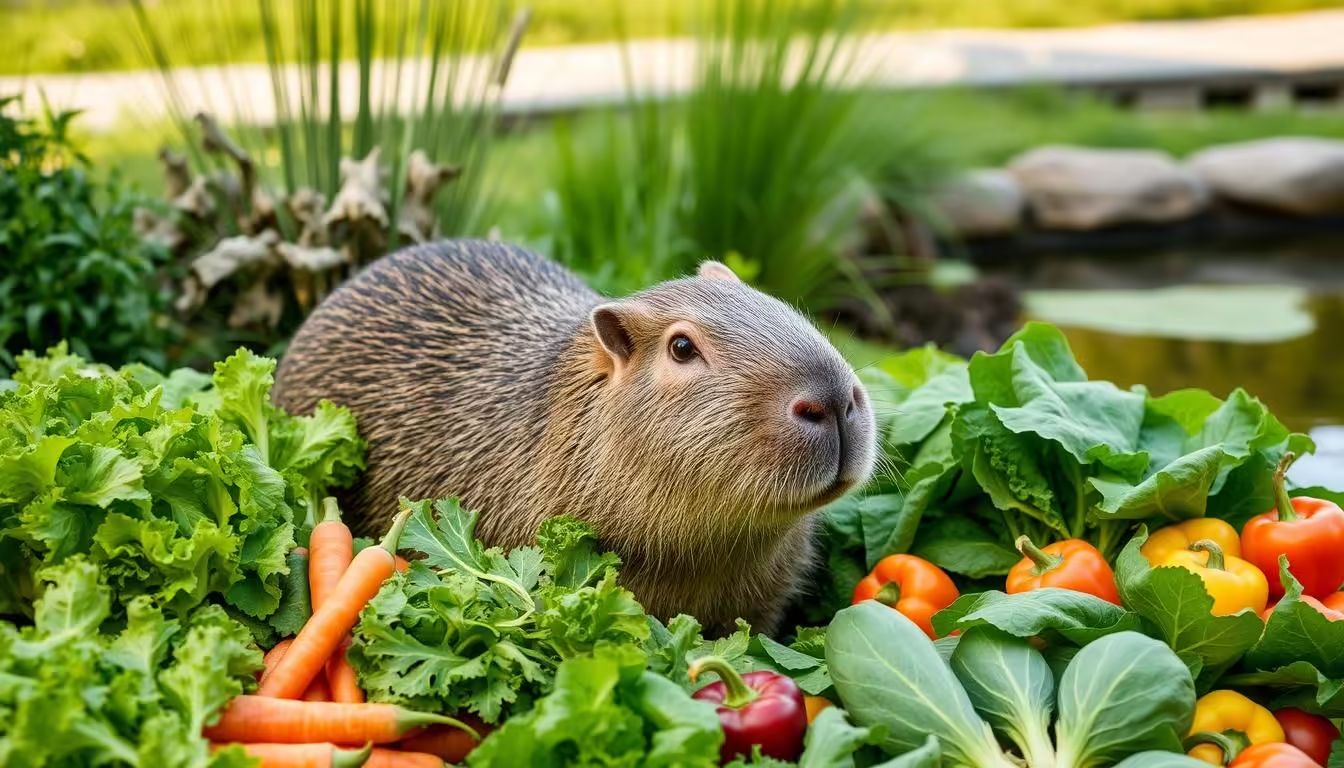Capybaras need careful attention and observation as exotic pets. Spotting health problems early is key to their well-being. It’s important for owners to know what’s normal for their capybara. This way, they can quickly notice any changes.
Signs of health issues include a bad coat, loss of appetite, and being very tired. Also, changes in poop color or consistency are red flags. The problem is, capybaras might hide signs of illness. So, it’s crucial to keep a close eye on them regularly.
Key Takeaways
- Changes in behavior and appearance are key indicators of health issues in capybaras.
- Observing coat condition, appetite, and energy levels can help detect potential problems early.
- Capybaras may hide symptoms, making regular monitoring of their physical and behavioral cues crucial.
- Prompt identification of health concerns is vital for providing appropriate care and treatment.
- Understanding normal capybara behavior and appearance is essential for recognizing changes that signal potential health problems.
Understanding Capybara Health Basics
Capybaras, part of the rodent family, have special health needs. They need a diet rich in grass to keep their teeth healthy. But, it’s hard to keep an eye on their health because of their behavior.
Natural Health Characteristics of Capybaras
Capybaras are built for life in wetlands. They are big, have thick fur, and webbed feet. These features help them swim well. But, they also have a natural way to hide when they’re sick.
Why Capybaras Hide Illness Symptoms
In the wild, showing weakness makes capybaras easy prey. So, they hide their sickness. This makes it tough for owners to spot health problems early.
Importance of Regular Health Monitoring
Owners need to watch their capybaras closely. Look for changes in how they look, eat, and act. These signs can mean they’re not feeling well. Quick vet visits are key to keeping them healthy.
“Capybaras, like many wild animals, tend to hide signs of illness as a survival mechanism. This behavior can make early detection challenging, emphasizing the need for regular health checks and close observation.”
How to Recognize Early Signs of Health Issues in Capybaras
It’s important to watch the health of capybaras closely. They can hide signs of illness well. By noticing small changes in how they look and act, we can spot problems early. This helps us take action quickly to help them.
Look out for changes in their fur, like bald spots or too much hair loss. If they stop eating or lose weight, it could mean they have a digestive issue. If they seem tired or hide more than usual, they might not be feeling well.
How a capybara sits or rests can tell us a lot. If they seem uncomfortable or roll in odd ways, it could mean muscle or nerve problems. Also, watch for sunken eyes, which might mean they’re dehydrated, and teeth grinding.
Capybaras’ eyes are very expressive. If their eyes seem dull or unfocused, it could mean they’re not feeling good. If they make strange sounds or move their head or nose in odd ways, it’s another sign they might be sick.
By paying attention to these early signs, we can help our capybaras before things get worse. Regular checks and quick vet visits are key to keeping them healthy for a long time.
Physical Appearance Changes and Warning Signs
It’s important to watch how your capybara looks for health signs. Regular grooming and watching them closely helps a lot.
Coat and Skin Condition Assessment
Look at your capybara’s coat for any bad signs. A healthy capybara has a smooth, shiny coat. If the coat looks different, it might mean they have a skin problem, allergy, or aren’t getting enough nutrients.
Weight Changes and Body Posture
Changes in weight are a big warning sign. Losing weight too fast or not gaining weight can mean they’re not eating well or have other health issues. Also, watch how they stand. If they look hunched or don’t want to move, they might be sick or in pain.
Eye Appearance and Expression Changes
Keep an eye on your capybara’s eyes. If they look sunken or dull, they might be dehydrated. Changes in their eyes can also mean they’re not feeling well. A healthy capybara has bright, alert eyes and seems calm and interested.
By checking your capybara’s looks often and watching for changes, you can catch health problems early. Keeping up with capybara grooming and doing regular capybara health checks is key to their health and long life.
Behavioral Changes That Signal Health Problems
Capybaras often show health issues through behavior changes. As exotic pet lovers, watching for these changes is key to their health. It’s important to notice any unusual behavior in these lovable animals.
One big sign is if they start hiding more. Healthy capybaras love to sunbathe or hang out with their friends. But if they suddenly want to be alone, it might mean they’re not feeling well. Also, if they seem tired, don’t want to eat, or act differently around others, it’s a warning sign.
They might also show physical signs of being uncomfortable. This could be moving a lot or doing odd movements. If they’re making different sounds, like grinding their teeth, it’s a sign of pain. Changes in how they sleep or interact with their space can also hint at health problems.
| Behavioral Changes | Potential Health Implications |
|---|---|
| Increased hiding behavior | Discomfort or illness |
| Lethargy | Underlying health issues |
| Loss of appetite | Digestive or nutritional problems |
| Changes in social interactions | Stress or mental distress |
| Frequent position shifting or repetitive movements | Physical discomfort or pain |
| Altered vocalization patterns | Dental, respiratory, or other health concerns |
| Changes in normal activities or sleep patterns | Environmental or physiological issues |
By watching capybara behavior closely, pet owners can catch health problems early. This helps keep these amazing animals healthy and happy for a long time.
Dental Health and Common Teeth Problems
Keeping capybaras’ teeth healthy is key. Their teeth grow all the time and need to be worn down. This prevents them from getting too long. Dental problems can really hurt their health.
Signs of Dental Distress
Capybaras show signs of dental trouble like drooling a lot, frothing, eating issues, and grinding teeth. These signs mean they might have abscesses, cracked teeth, or overgrowth. They need to see a vet fast.
Proper Dental Care Requirements
Regular dental checks and a diet full of tough, fibrous foods are vital. Chew toys help wear down their teeth naturally. Without proper care, capybaras can face serious health problems or even death.
Impact of Diet on Dental Health
A bad diet can cause dental issues in capybaras. They need to eat grass, hay, and veggies to keep their teeth in check. Also, avoid giving them chlorinated water, as it’s bad for their health, including their teeth.
| Dental Issue | Prevalence | Causes | Treatment |
|---|---|---|---|
| Overgrown Teeth | Most Common | Improper Diet, Lack of Wear | Dental Corrections, Dietary Adjustments |
| Abscesses | Common | Infections, Trauma | Antibiotics, Drainage, Pain Management |
| Cracked Teeth | Occasional | Accidents, Chewing on Hard Objects | Veterinary Treatment, Dental Corrections |
Knowing the signs of dental problems, feeding a balanced capybara diet, and taking care of their teeth are crucial. This helps keep these amazing animals healthy and happy.
Digestive System Issues and Symptoms
Capybaras, the world’s largest rodents, have strong digestive systems. But, they can still face digestive problems. It’s important to spot early signs to keep them healthy.
Gastrointestinal stasis is a serious issue where the intestines slow down or stop. This can occur if capybaras don’t eat enough or lack fiber. Symptoms include bloating, less bowel movements, and stomach pain.
- Changes in fecal consistency or color
- Loss of appetite
- Lethargy
A good capybara diet is key. It should include fiber, clean veggies, and proper care. It’s also vital to remove uneaten food and see a vet if capybara symptoms don’t go away.
“Maintaining a healthy digestive system is paramount for the wellbeing of these amazing rodents.”
By watching closely and acting fast on digestive issues, capybara owners can help their pets live long, happy lives.
Essential Nutritional Requirements and Deficiencies
Keeping a capybara healthy means giving them the right food. These special rodents need certain nutrients to stay well. One key nutrient is Vitamin C, as they can’t make it themselves.
Vitamin C Deficiency Signs
A lack of Vitamin C, or scurvy, can cause many problems. Signs include slow growth, hair loss, and weak bones. Adult capybaras need at least 1,000 mg of Vitamin C every day.
Dietary Needs for Optimal Health
Capybaras also need a diet full of grasses, hay, and vegetables. Their bodies are made to digest a diet rich in fiber but low in calories. The right mix of these foods is key to their health.
Common Nutritional Imbalances
Feeding them wrong can cause health issues. Vets say to avoid sweet vegetables, fruits, and items with added sugar. These can upset their digestive system. Regular vet visits and blood tests can spot and fix nutritional problems.
Knowing what capybaras need to eat is important for their health. Capybara owners must manage their diet well. This is a big part of caring for an exotic pet.
Environmental Factors Affecting Capybara Health
Capybaras need special care to stay healthy. They need the right living space, water, and protection from extreme weather. These are key for their health and happiness.
Capybaras can’t handle very cold or hot temperatures well. In cold places, they might get frostbite. In hot areas, they need water for swimming and staying cool.
Keeping their living area clean is also important. Don’t use chlorine in their water, as it can harm them. A calm and social environment helps them stay healthy too.
Wild capybaras live about 4 years, but can live up to 10 years in captivity. Giving them the right environment is crucial for their long life as exotic pets.
“Capybaras are widely distributed rodents throughout most of South and Central America, and they are restricted to areas of standing water. Habitat alteration, such as the conversion of the Gran Chaco ecosystem in Paraguay from dry tropical forest to pastureland, has created potential for capybara invasion into newly fragmented areas.”
Knowing how environment affects capybara health is key for capybara care lovers. By creating the right environment, you can ensure their long-term health and joy.
Conclusion
Keeping capybaras healthy as pets means watching them closely, feeding them right, and taking them to the vet often. Spotting health problems early is key to treating them well and keeping your capybara happy.
Knowing what’s normal for your capybara helps you catch any signs of trouble fast. A good diet, the right home, and vet visits are all important. They help your capybara live a happy life with you.
By paying attention to your capybara’s needs and getting help when needed, you can make sure they live a long, healthy life. With the right capybara veterinary care and attention to their exotic pet health needs, these amazing animals can do well in a home setting.



